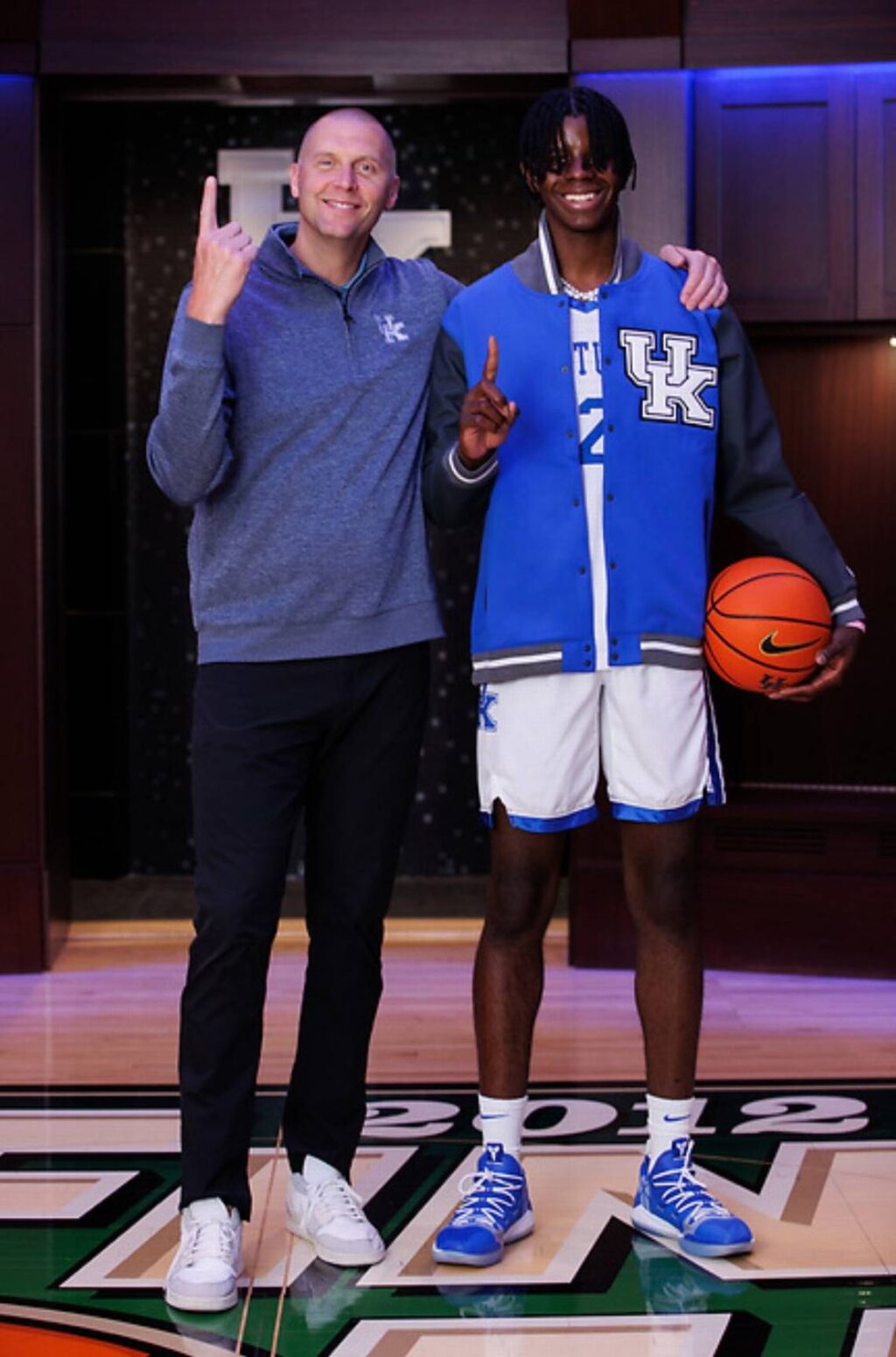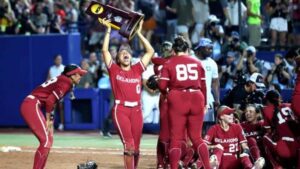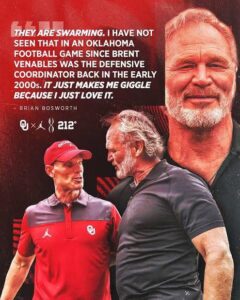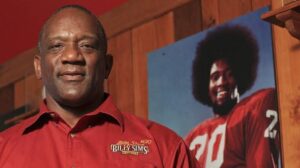
In a remarkable twist to college basketball recruitment, 7-foot-9 prospect Olivier Rioux has turned down a $5.5 million offer from the University of Tennessee in favor of committing to the University of Kentucky. This bold move has sent ripples through the sports world, raising questions about the changing landscape of college athletics, particularly in the era of Name, Image, and Likeness (NIL) deals. While Tennessee put forth a groundbreaking financial offer, it was the allure of Kentucky’s long history and basketball legacy that ultimately swayed Rioux’s decision.
Rioux, whose towering presence on the court and impressive skill set have made him a hot commodity, is now firmly in the spotlight. As one of the most highly sought-after recruits in college basketball, his decision is being watched closely by fans, analysts, and college coaches alike. But what factors led to this surprising outcome? And how will this decision affect both programs, as well as the broader landscape of college sports?
Before diving into the specifics of the offer and the programs involved, it’s essential to understand who Olivier Rioux is. Standing at 7 feet 9 inches, Rioux has the rare combination of physical dominance and basketball prowess that makes him an elite talent. He hails from Montreal, Canada, and has become one of the most intriguing young players in the world of basketball due to his remarkable size and skill set.
Rioux’s journey to becoming one of the most coveted prospects in college basketball began in his home country, where he first gained attention for his impressive performances in local leagues and international competitions. He represented Canada in various junior tournaments, showcasing not only his size but his ability to play with finesse and coordination rare for someone of his height. His shot-blocking ability, rebounding prowess, and improving offensive game made him a standout.
Rioux’s story is one of dedication and constant improvement. While his physical gifts put him on the map early, it was his work ethic and commitment to refining his game that made him one of the most talked-about recruits in recent years. As of today, his combination of size, athleticism, and basketball IQ has made him a top-tier prospect for any program looking to dominate the paint and improve their overall defense.
The University of Tennessee, known for its competitive basketball program, has always been a contender in the SEC. However, with the rise of NIL deals and the financial possibilities they present, Tennessee took an extraordinary step to secure Rioux’s commitment. Offering a staggering $5.5 million, the Volunteers were clearly willing to push the envelope in their pursuit of this generational talent.
The offer is significant for several reasons. First, it underscores the shifting dynamics in college athletics, where recruitment no longer revolves solely around scholarships and playing time. NIL deals, which allow student-athletes to profit off their name, image, and likeness, have introduced a new layer of competition. Tennessee’s $5.5 million offer highlights the increasing role of financial incentives in the recruitment of elite talent. The sum would have likely placed Rioux among the highest-earning college athletes in the country, with potential sponsorships and partnerships further increasing his financial prospects.
Tennessee’s decision to present such a substantial offer is a clear indication of the growing importance of NIL in college sports. For the Volunteers, securing a player of Rioux’s caliber would not only strengthen their team but also provide a significant boost to their brand. With the right mix of marketing, endorsements, and media exposure, a high-profile recruit like Rioux could elevate the program to new heights.
Despite the unprecedented offer from Tennessee, Olivier Rioux ultimately chose to commit to the University of Kentucky, a school with a rich basketball history and a track record of developing NBA-caliber talent. Kentucky, under head coach John Calipari, has long been a powerhouse in the world of college basketball, regularly producing top-tier talent and competing for national championships.
So, why did Rioux choose Kentucky over Tennessee, despite the financial allure? There are several factors at play here. First and foremost, Kentucky’s basketball program is one of the most storied in the country. The Wildcats have a legacy of success, with multiple national championships and a long list of NBA legends who have come through the program. For any elite player, the opportunity to be a part of that tradition is a major selling point.
In addition, Kentucky’s reputation for developing players into professional-level talent was a significant draw. With players like Anthony Davis, John Wall, and Devin Booker having gone through Kentucky’s system, Rioux likely saw the program as the best place to further his development and prepare for a career in the NBA. The opportunity to be coached by someone like Calipari, known for his ability to develop NBA-ready players, cannot be understated.
Moreover, the cultural fit and the overall program environment likely played a role in Rioux’s decision. Kentucky offers a unique combination of tradition, competition, and professional development, which would be appealing to any top-tier recruit.
Rioux’s decision to reject a $5.5 million offer is a reflection of a larger trend in the world of college sports: the increasing role of NIL deals. Since the NCAA’s NIL policy change, athletes have been able to profit from their name, image, and likeness, creating a new era of recruitment that is both financially driven and player-centric.
Tennessee’s enormous offer is just one example of how schools are utilizing NIL deals to attract top talent. In the past, recruitment was solely about scholarships, playing time, and coaching. Today, the financial aspect has become equally important. With the possibility of securing multi-million-dollar deals, top recruits are no longer just considering their athletic opportunities but also the potential for financial gain.
However, despite the significant sums being offered, NIL deals also come with their own set of challenges. The influx of money into the recruiting process could change the nature of college athletics, potentially leading to a more transactional environment. Schools with deep pockets may have an advantage in attracting elite athletes, while others may struggle to compete on that level.
In Rioux’s case, the Tennessee offer is an extreme example of the potential rewards that NIL deals can bring, but it also reflects the growing divide between traditional college basketball powerhouses and those with the financial resources to make such extravagant offers.
Olivier Rioux’s decision has far-reaching implications for both Tennessee and Kentucky. For Tennessee, the rejection of a $5.5 million offer is a blow to their recruitment strategy, particularly after making such a significant financial commitment. However, Tennessee will likely continue to focus on leveraging NIL opportunities and building their program through a combination of high-end recruits and strong team development. Rioux’s decision may signal a need for Tennessee to rethink their approach and focus on aspects beyond financial offers, such as team culture, coaching, and long-term player development.
For Kentucky, Rioux’s commitment is a massive win. Securing a player of his caliber enhances their chances of competing for national championships in the future. With his size and talent, Rioux will be a key asset for the Wildcats in both their defense and rebounding efforts. Moreover, Rioux’s presence could help Kentucky attract other high-profile recruits, further strengthening their position as one of the elite programs in college basketball.
As NIL deals continue to reshape the recruitment process in college sports, Rioux’s decision serves as a bellwether for the future. With more money pouring into the system and schools able to offer significant financial incentives, the recruitment of top athletes is becoming more competitive than ever. The decision-making process for recruits is no longer about just playing time or the prestige of a school’s program; financial opportunities and the potential for future earnings are now central to the conversation.
Moving forward, we can expect to see more instances where recruits are making decisions based on a complex mix of factors, including financial opportunities, developmental prospects, and team culture. Schools will need to adapt to this new reality by crafting recruitment strategies that not only focus on athletic development but also take into account the financial and personal aspirations of young athletes.
As for Olivier Rioux, his decision to reject an extraordinary financial offer and commit to Kentucky shows that, while money is undoubtedly a factor, the pull of tradition, development, and legacy remains just as strong. In the end, Rioux’s choice is a reminder that college sports, despite the massive financial investments, still rely heavily on the intangible aspects of program culture and personal growth.
Olivier Rioux’s rejection of Tennessee’s $5.5 million offer in favor of Kentucky has sparked a new conversation about the evolving landscape of college basketball recruiting. As NIL deals become an increasingly influential factor in athlete decision-making, programs will need to balance financial incentives with the rich traditions, coaching, and player development opportunities that schools like Kentucky have always offered.
Rioux’s decision also highlights the importance of the broader college sports culture, where legacy, tradition, and the potential for NBA development play just as crucial a role as financial offers. As the NIL era continues to unfold, it’s clear that the future of college sports will be shaped by a complex interplay of money, culture, and personal ambition.





